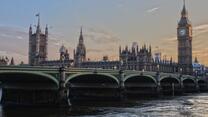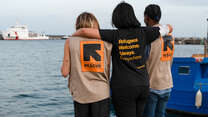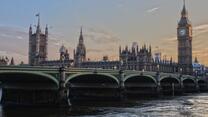UK citizens may often take for granted the ease with which they can travel to many countries around the world.
However, for refugees and asylum seekers who are forced to flee their homes due to conflict or persecution, they face a very different reality. The reason they can't simply board a plane to safety lies in the strength of their passports – or lack thereof.
Where a person is born plays a crucial role in determining their freedom of movement, access to opportunities, safety and stability. For refugees and asylum seekers, an inability to travel freely can have huge consequences. It can trap them in conflict zones, restrict their ability to seek safety and force them into dangerous, irregular journeys.
This is why the need for safe routes is critical to stop refugees and asylum seekers facing dangerous journeys to reach safety.
Understanding passport strength
Passport strength is measured by how many countries a person can visit without needing a visa or by getting a visa on arrival. The stronger a passport, the more freely that person can travel.
Measured through indexes such as the Henley Passport Index, the strength of a passport reflects a country's international agreements and political standing.
Countries with strong passports allow people to easily access hundreds of destinations. In contrast, weak passports severely limit international travel options, often requiring lengthy, complicated and expensive visa processes for even short visits abroad.
This disparity becomes critical in times of crisis and means those with weak passports face significant barriers when attempting to escape dangerous situations in their home countries.
The world's strongest passports
- Singapore (195 locations)
- France, Germany, Italy, Japan, Spain (192 locations)
- Austria, Finland, Ireland, Luxembourg, Netherlands, South Korea, Sweden (191 locations)
- Belgium, Denmark, New Zealand, Norway, Switzerland, United Kingdom (190 locations)
- Australia, Portugal, (189 locations)
According to the 2024 Henley Passport Index, the most powerful passport in the world belongs to people from Singapore, allowing them access to 195 locations visa-free or visa-on-arrival. France, Germany, Italy, Japan and Spain are also very high on the list (192 locations), as well as Austria, Finland, Ireland, Luxembourg, Netherlands, South Korea, Sweden (191 locations).
For those born in the United Kingdom or holding a UK passport, they can travel to 190 visa-free or visa-on-arrival destinations, along with Belgium, Denmark, New Zealand, Norway and Switzerland. These strong passports allow people to move freely across borders, making it relatively easy for people to travel for business, education and leisure.
The world's weakest passports
- Afghanistan (26 locations)
- Syria (27 locations)
- Iraq (31 locations)
- Yemen (33 locations)
- Pakistan (33 locations)
In contrast, the world's weakest passports offer access to fewer than 30 countries. Afghans, for instance, can only travel visa-free to 26 destinations. Syria (27), Iraq (31), Yemen (33) and Pakistan (33), are also very low on the list. For citizens of these countries, travel is incredibly difficult, including complex visa procedures, frequent rejections and restrictions on movement.
There is a clear connection between passport strength and humanitarian crises. Countries with the weakest passports are often those listed on the International Rescue Committee’s (IRC) Emergency Watchlist, reflecting ongoing conflicts and political instability. These include Somalia, with people only having access to 35 countries, as well as Sudan (43), South Sudan (44) and Myanmar (46).
With people fleeing conflict zones often coming from countries with the weakest passports, this means they can't easily enter other countries to find safety and forces them to take dangerous routes, like crossing the Channel in small boats.
Wealth and migration
Ability to travel is also strongly connected with the wealth and development of countries. The International Organisation for Migration (IOM) reports that the vast majority of migration happens between countries that are high on the Human Development Index (HDI), which measures things like income, education and living standards.
This means the vast majority of international migration is people of wealthier countries travelling to other wealthy countries. On the other hand, people from low-HDI countries face significant challenges when trying to move. Strict visa and migration policies make it much harder for them to find better opportunities and safety in other countries.
The need for safe routes
Refugees and asylum seekers face numerous obstacles while trying to seek safety for themselves and their families. Airport closures, dangerous environments and lack of legal documentation create significant barriers to crossing borders safely.
The UK's system is particularly challenging, as currently people can only claim asylum if they are physically present in the country, yet there is no asylum visa that would allow them to enter regularly for this purpose. This forces many people to resort to irregular routes such as Channel crossings and can leave asylum seekers from countries such as Syria, Afghanistan, and Sudan no choice but to rely on smugglers.
There is an urgent need for more compassionate and practical solutions. Establishing safe routes for asylum seekers would not only save lives, but also uphold the fundamental right to seek protection from persecution.
Read more: What are safe routes for refugees? Four common myths explained
What is the International Rescue Committee?
The International Rescue Committee (IRC) helps people affected by humanitarian crises to survive, recover and rebuild their lives. We work in over 50 crisis-affected countries.
The IRC in the UK
In addition to helping people in the midst of humanitarian crises, the IRC helps refugees living in the UK recover and rebuild their lives. Read about our UK programmes.



